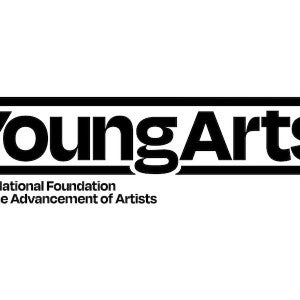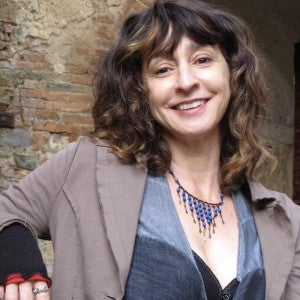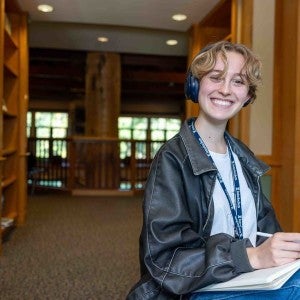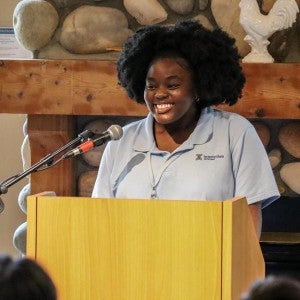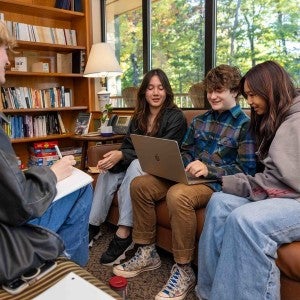Word magic: Interlochen’s Director of Creative Writing Karyna McGlynn shares her passion for poetry with students
McGlynn forged her unique poetic voice in slam poetry competitions. She shares her story and gives advice to young writers.
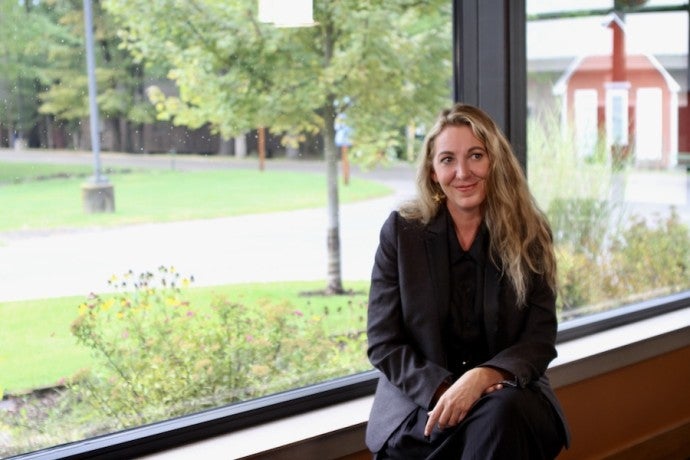
Karyna McGlynn was in fifth grade when she won her first poetry prize. After submitting an original chapbook and earning the John J. Berman Young Author’s Award, McGlynn realized that her life would never be the same.
“It was the first time I felt really recognized for something, good at something,” McGlynn remembers.
Now the Director of Creative Writing at Interlochen Arts Academy, McGlynn has found considerable success as a poet. She’s earned the Rumi Prize for Poetry and the Academy of American Poets' Prize, as well as numerous fellowships. She’s taught at universities across the United States, and her poetry has been published in magazines from Ninth Letter to Kenyon Review.
But despite the many accolades she’s earned, McGlynn remains connected to her roots. Her poetic voice was forged in the raucous world of slam poetry. For as long as she can remember, McGlynn has been a girl who loved the sounds of words. Now, she’s ready to share them with students at Interlochen.
“I’m obsessed with the sound of language”
McGlynn’s romance with the written word started at a very young age, with her family setting the example.
“My mom was a language arts teacher, my stepdad was a college professor, and my granddad was also a professor,” she says. “I grew up with a family of teachers, and I grew up being read to constantly.”
I'm obsessed with the sound of language. I’m obsessed with the ways we can recombine words, and I always have been.
From the beginning, McGlynn was fascinated with the auditory qualities of language. Years of listening to comedy and spoken word albums only fanned the flame.
“I'm obsessed with the sound of language,” McGlynn says. “I’m obsessed with the ways we can recombine words, and I always have been.”
It wasn’t until middle school, however, when McGlynn realized she had a gift for verse. Her initial success spurred her to create many more chapbooks, and she eventually became interested in a more auditory way of expressing herself: slam poetry.
Writing for the stage, writing for the page
At a poetry slam, poets perform their work aloud in front of an audience and judges. These readings are often very spirited, with audiences offering live reactions and judges deciding who gets to stay in the competition.
“They hold up Olympic-style scores from 0.0 to 10.0 and tell you exactly what they thought of your poem,” says McGlynn.
McGlynn came onto the poetry slam scene at its peak in the 1990’s. She was a member of five National Poetry Slam teams, and the experience strongly impacted her approach to writing poetry.
“Slam poetry taught me so much,” says McGlynn. “In creative writing workshops, we often talk about anticipating readers’ needs. We ask: what does the reader need to know at this point? Are they suddenly bored here? Are they a little confused? Do they feel like you're showing off? Is this joke actually landing?”
“Slam poetry is great because when you get up on that stage, you are getting immediate feedback from a quite rowdy audience,” she laughs.
True to her childhood passion, McGlynn remains intensely conscious of the sounds of words.
“I really think a lot—and always have—about writing not only for the page, but for the stage. Writing for the ear, writing for the mouthfeel.”
Advice for young writers: be precise, imitate the best
Slam poetry isn’t the only real-world experience McGlynn brings to Interlochen. She’s penned six books of poetry. She was also Poetry Editor and Managing Editor for Gulf Coast, so she can offer an insider’s perspective on the editorial process.
“I'm able to get students to think about what is going on from the other side of the desk,” she says.
Every single choice you make on the page counts—all of it has to be a deliberate decision.
She advises young writers to be painstakingly precise: mistakes as innocuous as a misnamed document or a formatting error can be the difference between rejection and publication.
“There's no room for mistakes in a manuscript. There's too many people competing for that,” she says. “Every single choice you make on the page counts—all of it has to be a deliberate decision.”
When asked for advice on developing a writing voice, McGlynn acknowledges that the answer is counterintuitive.
“Imitate other writers,” she says. “You discover your voice through imitating other people, in the same way we learn to walk and talk by imitating the people around us.”
Teaching in a feedback loop
In addition to her work as a poet, McGlynn is also a collage artist. In keeping with one of Interlochen’s five key capacities—Interdisciplinary Perspective and Collaboration—she’s made it her mission to recruit visual artists and other creatives to work with her young writers.
“I'm bringing in two New Yorker cartoonists and graphic novelists to teach Cartooning for Writers over the next year,” she says.
Other current and upcoming offerings include a spoken word class, a humor writing workshop, and an image and text class which McGlynn says will explore everything from collage and erasures to TikTok memes.
Having already served as associate professor of creative writing and literature at Christian Brothers University, McGlynn is excited to put her teaching talents to work once again.
“When it's working well, it's super addictive. It's a feedback loop,” she explains. “When I really get into a subject matter, and I'm having fun explaining the wonder of, say, the metaphysical conceit, to my students, they can feel me having fun. They're more engaged and they start asking me better questions. They start exhibiting natural curiosity in ways that push me not only in the classroom, but in my writing.”
For her, the dual lifestyle of teaching and writing becomes symbiotic.
“My students inspire my poems all the time,” she says. “They're constantly giving me ideas for poems, ideas for collages or images, and saying ‘here, you can have that if you like it.’ They're giving me jokes. I go home, inspired, with cartoon hearts in my eyes every night.”
A bright future
The future is bright for McGlynn, who’s seen two of her poems accepted for publication in Poetry this October. She’s also hard at work on a new book, a collection of lyric essays about dance.
“The working title is Epic Dance Scenes,” says McGlynn. “It's going to be essays that are part cultural criticism, part memoir, but all unified by dance scenes in movies.”
McGlynn’s journey in writing has taken her to many exciting places, but she remains, at heart, the same girl with an obsession for the beauty of precise sound and vivid imagery. One of her poems, “When Someone Says I Love You,” describes how a few words can change everything:
“the whole room fills up with iced tea, something gives:
the sun peels from your window, a sugared lemon
whole, flaming, hanging there … ”
For McGlynn, the power of language is a kind of magic that’s accessible to everyone.
